Heralds of the Siege Read online
Page 17
‘No, you merely put me out of the way for a while. Or forever. Fight me!’ he shouted.
Shang’s body language changed. ‘You forget, I fought against the Lion and his best warriors alongside our father, and I lived.’
‘Yes, you did. How’s the hand?’ laughed Skraivok. ‘Have no doubt, Shang – I may not possess their power or their pride, but I have no fear of death, and that makes me more dangerous than any primarch.’
‘You think they will be afraid of you? You are insane.’
Skraivok grinned. ‘I keep telling you, I am not. I do not care if you live or die. Relinquish your claim, or I will kill you. You can be certain of that.’
Shang jerked his head. Thandamell backed away slowly. Skraivok let his sword follow him for a metre – he was exposed, but he was confident that Shang would not order him shot. The others would never trust him again after so blatant an assassination.
Shang drew his own blade as he came out from behind the table. It emitted a sharp crack as he ignited the disruption field.
‘Think again, Painted Count,’ said Shang. ‘This is your last chance.’
‘I have no second thoughts,’ Skraivok replied.
‘So be it.’
Shang came at him fast, his sword held in a double-handed grip.
Time slowed. Skraivok saw the blow coming before Shang had finished formulating his attack. As Shang swung at him, Skraivok stepped out, round, and spun, his sword skimming over the top of the captain’s backpack, and cutting neatly through the skull.
Shang stumbled. His mouth gaped and went slack. His knees gave out, and he collapsed, the upper half of his head sliding free as he fell, spilling his brains across the floor.
A stunned quiet gripped the room.
‘Did you see how fast he moved...?’ someone whispered.
‘None of you understand anything,’ Skraivok called out. ‘You are arrogant and narrow-minded. You think you know power. You think power is invested in the here and now – that it can only be won through violence, terror and cruelty, the dominance of your will over the flesh of others. That is not power...’
He brandished the sword.
‘We look down upon Horus’ allies that court the services of the warp, seeing them as feeble idolators. But there is power in the empyrean, there to be seized by those who are strong!’ The words came from his mouth, and in his voice, but he could not be sure they were entirely his own. ‘This is true power, far above anything in the material realm. You disdain what you do not understand.’
He sheathed the weapon. Despite its recent employment, it was bloodless. ‘Are there any more objections to my command? I have proved myself twice now. I will not hesitate to do so again.’
The others looked back at him. No one said anything. Thandamell took a step forwards.
‘Hail Skraivok, first among claw lords,’ he said flatly.
‘Hail Skraivok, first among claw lords!’ the others echoed, tentatively at first, but with growing conviction. ‘Hail Skraivok, first among claw lords!’
‘Congratulations,’ said Thandamell. The Terror Master wore an insolent look on his face and kept his eyes locked with Skraivok’s, but he still knelt before him.
Skraivok looked at them all. The sensation of weight on his back grew noticeable for a moment, then faded from notice.
‘There are those among us who think the Legion is done,’ he said. ‘That stops now. We are not finished. Krukesh had a sizeable fleet, and he said more of our brothers survived Thramas. We here at Argosi represent a sizeable force, but we will find more. We are still a Legion! I give you twenty days to finish the repairs to the Nightfall. Redouble all efforts. Strip the planet bare if need be, and oil the work with the blood of its people. In twenty days we shall depart, and we shall be ready to strike for Terra.’
Gendor Skraivok, the Painted Count
THE LAST SON OF PROSPERO
Chris Wraight
‘It has taken me a long time to find you,’ said Kalliston.
Brother-Sergeant Revuel Arvida looked up. The sun was hot, baking the mesa, making the sky shake. Rock formations in pale pink and sienna-brown marched out towards an empty horizon, flecked with broken bars of scrub.
‘I do not understand why,’ said Arvida, getting to his feet. ‘I told you where I would be.’
‘The desert is a big place.’
Both legionaries were coated in a fine layer of dust. Menes Kalliston, the taller, wore full battleplate save for the crested helm that hung at his belt on a bronze-linked chain. Arvida wore fatigues, loose-fitting, white against the glare. His skin glistened with sweat. Away on the horizon, a line of gold-cranes flapped lazily into the noon haze.
‘What did you learn?’ asked Kalliston.
Arvida looked away from him, upwards, out into sunlight-blurred air. Something gauzy hung there, intermittently visible, caught like a reflection on the edge of vision. Look at it directly and it was gone – only in the half-glance could you see it, and then just for a moment.
‘The sight is failing,’ Arvida said. ‘Falling out of the world. I see stone and sky, nothing beyond.’
Kalliston smiled. ‘It will return. The Great Ocean has its tides.’
‘Or it may dry up.’
‘Does your tutelary give you no guidance?’
‘When I am blinded, Ianius is blinded. When I see, he sees.’
Kalliston nodded. He reached up to wipe sweat from his brow. ‘I wish I could give you more time, but orders have come – we are to make for the void.’
‘Now?’
‘So it seems.’
‘Whose orders?’
‘The primarch’s.’
Arvida resisted a little longer. He had worked hard to control it, the need to probe, the tendency that had prevented his ascension through the Legion hierarchy, despite the power that even Ahriman had told him he possessed. The Thousand Sons were a deferential Legion. A respectful Legion. A Legion within which loyalty counted for more than in most.
‘I do not understand it,’ he said, despite himself. ‘The Ocean is in turbulence – the few visions we still have are all of murder. The guard on Prospero must be maintained, now more than ever. Even you, brother-captain, have counselled the same.’
‘So I have.’
‘And so why–’
‘What would you have me do?’ Kalliston’s severe face creased into another smile, but there was something under it – a weariness, perhaps, or possibly self-reproach. ‘We make for the void. The skimmer is already on its way.’
Arvida looked away. The faint gauze flexed in the air above him, sparkling like sunlight reflected from water. Far out over the hard-beaten earth, the wind whipped dust into tiny vortices, suspended for a heartbeat or two before scattering into nothingness. The deserts of Prospero were changing, turning green as irrigation schemes spread out from the nexus at Tizca. One day the barren lands would be as lush as gardens.
‘Why now?’ Arvida asked.
‘He will have his reasons.’
‘Then he could share them.’
‘Will he live?’
Arvida looked up. ‘What?’
‘Can he overcome the change?’
‘I do not understand you.’
And then Kalliston was gone. Prospero was gone.
Only Ianius remained, hovering like a memory over the deeps, still sparkling in the doused sunlight.
‘Why did we trust?’ Arvida murmured, not expecting an answer, because he had asked that many times before, and had never yet had a good one.
‘Will he live?’ asked Khalid Hassan.
The chamber was pooled with darkness, so far underground that no sunlight had ever scraped across the wet stone. It should have been cold, but the flags underfoot were blood-warm and had been ever since the first wards had been broken. There were noises below, terrible noises, things that had not been heard since the oldest nights of the species’ unguarded ignorance. Never ceasing, they clawed at the frail edge of sanity itse
lf.
‘Can he overcome the change?’ Hassan pressed.
He felt the weight of responsibility. He had been the one to retrieve the subject from the V Legion warship Lance of Heaven. He had placed him in the stasis pod and arranged the warding patrols that had kept the Wolves of Fenris from detecting the transport. He had promised the weather-shamans of the White Scars that this warrior would be looked after, that he would remain intact long enough for rites of healing to be undertaken.
The vow had been honoured insofar as the Thousand Sons legionary had been taken into the care of the Sigillite, but whether it was fair to describe him as ‘intact’ remained moot.
The old armour had gone, peeled away during a surgery lasting six hours. The flesh within was bloated almost into obesity, mottled with burst blood vessels and discoloured into coralline outgrowths. What had once been thick muscle overlaid on a heavy bone structure was now flabby, gilled, pulsing, slick with fats and sweats.
Many hands worked in that chamber. Orderlies brought in blood-cyclers and hypodermics, their faces swaddled in masks and their movements reminiscent of reverent monks. Robed adepts tended hissing respirator columns, their cowled faces never leaving gas-lenses running with esoteric data. Columns of incense rose up from strategically placed bronze bowls, making the chamber stink sweetly in a melange of blood and drained pus. Other figures, dark-robed, thin as whips, prowled the edges, reciting protective words in a language that had been dead long before the false dawn of Unification.
‘Will you not give me an answer?’ Hassan ventured, pressing the issue. The guilt hemmed him in, made his presence superfluous.
For a while longer he received none. The only one who could have responded was bent low with labour, just as he had been since the body had been brought in. His heavy cloak was damp with sweat. He looked old, that man, older than any living soul had any right to be. His spine was curved, his breath rattled, and yet the aura of power still curled out from beneath the frayed exterior, as if someone had tried to conceal the heart of a star within a scatter of rags.
Eventually, the robed man stood, unravelling, stretching out, until he seemed to stand taller even than Hassan. He turned deep-sunk eyes from the mire of blood. Malcador, called the Sigillite, steadied himself on the edge of the medicae slab, and drew in a thin breath.
‘His soul wanders on the edge,’ he said.
‘Of life?’ asked Hassan.
‘Of damnation.’ Malcador reached for a goblet and took a long swig, the clear contents tracing a thin line down his chin. ‘It never could be cured from the outside. Not truly. That was the curse of it.’
He limped clear of the slab, feeling his way towards the far wall. In his absence the masked menials continued to tend the body, mopping it down with unguents and drawing arcane symbols on the heaving palls of flesh. Huge piped machines towered over them all, whirring, whispering, building up power and feeding it to crackling ether-traps.
Hassan followed his master. In the years since becoming one of the Chosen he had witnessed many testing things. He had traced paths across the deep void, snatching objects of value from under the bow wave of the oncoming traitor advance, and that had brought him into contact with some measure of the terror that Horus had unleashed upon humanity. Of all of it, though, seeing the Sigillite’s gradual erosion under the crippling burden of command was perhaps the hardest to accept. The Regent of Terra was burning up, burning out, breaking himself on the anvil of the Imperium’s slow collapse.
‘We knew his Legion suffered,’ Malcador said, his breathing still shallow, his face sallow. ‘Even before we discovered Prospero, we knew they were susceptible. We tried to aid them. We thought it was some error in the gene encoding. I myself thought that for many years, and we expended much labour to isolate it.’ He took another draught. ‘It was not the gene encoding. It was something deeper in them, something that went to their core. In the end, only he could do what was necessary. We all believed that Magnus had cured them. His father believed it. Why should we have doubted it? The Legions always needed their gene-sires – they had been designed to go together, and Magnus was the subtlest of them all.’
Hassan listened. Insights into the earliest days of the Great Crusade were given out rarely, and there were still secrets now shared only between the Sigillite and the Master of Mankind.
‘But Magnus fell,’ Hassan said.
‘He dared too much. He was too proud. But still, even now, he is the only one who ever prevailed over the flesh-change. He cured his sons, once.’
‘With sorcery.’
Malcador shot him a withering glance. ‘Of course with sorcery. He was birthed from sorcery. This whole place was built upon sorcery. Give it whatever name you will, but the time is past for pretence.’ He drank again, and the shaking in his hands receded a little. ‘I will not apologise. There was no other path to tread. Even now, even now, fate has not quite run beyond us. He is here, and he still draws breath. His soul is not yet lost.’
‘But… can anything… within that…’
‘He lives, Khalid. Even now. We still have time.’
The ship was empty. Its holds echoed; its corridors flickered with broken lumens. The Geometric had come out of the warp too soon, too close, and now the shields were breaking, the engines were beating, and something, something, was trying to get in.
Arvida ran down the longitudinal spinal corridor, feeling the deck flex under his boots. His breathing rasped in his helm, his hearts thudded a tight rhythm. He had been asleep, taking a single hour of true rest before duty called again. The warning klaxons had woken him, ripping him out of a dream where all the worlds of the Imperium were as ashes, wreathed in unbroken clouds, their continents turned to broken glass.
He felt sick. Something was wrong. Reality had flexed and strained. The corridor’s edges blurred and stretched out even as he ran down them.
Ianius was at his side, a diaphanous presence, calming him just by being there. He had forgotten if there had ever been a time when the tutelary had not been beside him. For a long time they had ceased to think of themselves as wholly separate entities. Ahriman had counselled that the companions were benign consequences of a greater understanding of the ether. But had they always been there, ready for discovery? Or had they been created somehow? Where did one soul end and the other begin?
Ianius did not like that speculation. It shimmered, shaking amid the sway and dance of emergency lights. Arvida found himself apologising even as he ran, requesting that it remain close, though he knew well enough that a tutelary never responded to reason.
A cacophony rang out from all around him – a hammering, a drumbeat of fists against the hull. He reached the bridge, and burst into its cavernous emptiness. Every servitor station was deserted. The command thrones turned slowly on their central columns. Out of the forward viewers he caught sight of a single world, lost in the blackness of the void, steadily burning.
Arvida approached the great crystalflex portal. Everything felt wrong. Everything felt false.
‘I never saw it burn,’ he murmured. ‘We were not in time.’
He whirled around, running his blurred gaze across the bridge. Screens fizzed with static noise. Augur-relays gave no information.
The hammering was growing stronger. Above him, the observation dome blister cracked. A heavy interior panel bulged inwards, impelled by some enormous impact.
Arvida drew his blade, and black flame ran along the edge. Ianius twittered in panic, rippling under the flashing combat-lumens. More impacts banged in – throom, throom, throom – and the jabber of nameless voices began to filter through the damaged hull.
‘He is my ward!’ came a roar, suffused with the stuff of the warp. ‘I have him under my countenance!’
Arvida looked up, around, his blade drawn but with no enemy to slay. ‘Where is Kalliston?’ he asked, and instantly knew there would be no answer to that, for Brother-Captain Kalliston had never existed here either. The burning world on the scopes
darkened, and the flames turned the dark red of old blood.
The hammering reached a crescendo. The ship was breaking.
Arvida felt himself dropping as the deck plates twisted, and he let the sword slip from his hands. Ianius ripped away, its silken haze blown apart by the rush of exploding atmosphere.
He tried to grip on to something, anything, but the universe was pulling itself apart.
The world burned, boiling the blood away into darkness.
‘We were too late,’ Arvida said, falling. ‘We never saw it burn.’
Malcador had moved away from the door even as it cracked. Hassan drew his laspistol and backed up. There were shouts from the other side, panicked shots, the heavy clang of impacts on the portal’s blast shields.
‘Behind me,’ Hassan implored, moving to shield the Sigillite.
But Malcador did not move any further. ‘Do not be foolish. There is not much that either of us could do to dissuade this one.’
The door cracked down its centre, smashed apart, its panels rammed back on their hinges. A warrior burst inside – a giant of a man, clad in ornate ivory armour, his eyes flashing with anger and untied black hair flying around his face.
‘He is my ward!’ roared the intruder, pointing accusingly at the Sigillite. ‘I have him under my countenance!’
Malcador bowed. ‘My lord Jaghatai,’ he said. ‘Try to calm yourself.’
The primarch swept towards him, as tall and gaunt as a hunting bird. His severe face was drawn with fury. ‘I gave you leave to find a cure,’ the Khan said. ‘I did not give you leave to bring him here.’
‘There was no alternative.’
‘Look at him!’ roared the Khan, swinging his heavy fist towards the quivering flesh-heap on the slab. ‘See what he has become.’
Malcador remained patient. The expression on his ancient face, drawn tight over the bones, was as cruel as it was perceptive, and did not waver. He reached for his staff, leaning on it like an old man would, shuffling across to the slab and regarding the body on top of it with something close to pity.

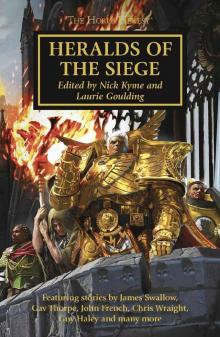 Heralds of the Siege
Heralds of the Siege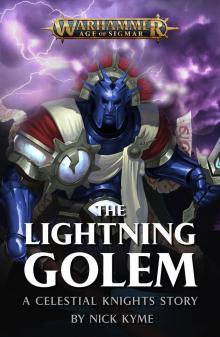 The Lightning Golem
The Lightning Golem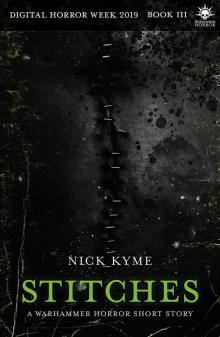 Stitches
Stitches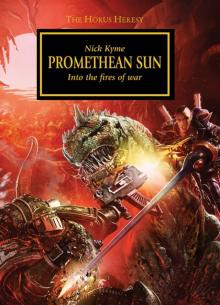 Promethean Sun
Promethean Sun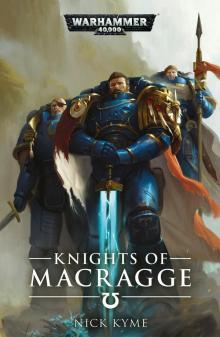 KNIGHTS OF MACRAGGE
KNIGHTS OF MACRAGGE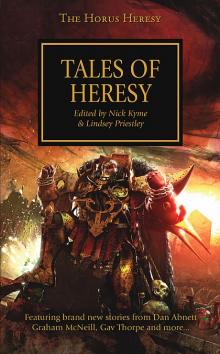 Tales of Heresy
Tales of Heresy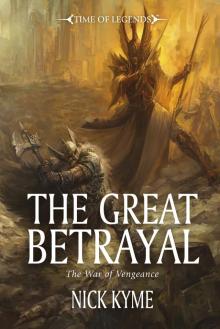 The Great Betrayal
The Great Betrayal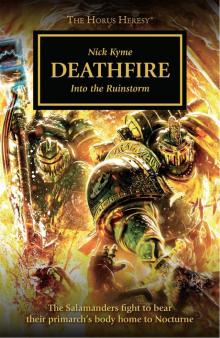 Deathfire
Deathfire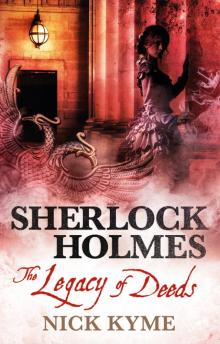 Sherlock Holmes--The Legacy of Deeds
Sherlock Holmes--The Legacy of Deeds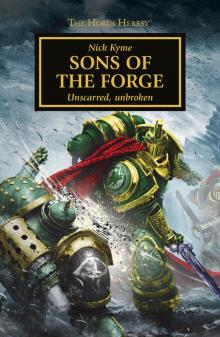 Sons of the Forge
Sons of the Forge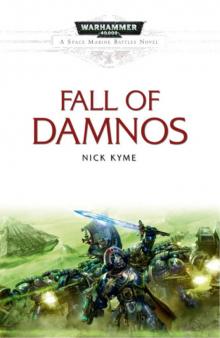 Fall of Damnos
Fall of Damnos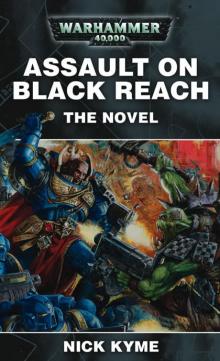 Assault on Black Reach: The Novel
Assault on Black Reach: The Novel![[Horus Heresy 10] - Tales of Heresy Read online](http://i1.bookreadfree.com/i/03/27/horus_heresy_10_-_tales_of_heresy_preview.jpg) [Horus Heresy 10] - Tales of Heresy
[Horus Heresy 10] - Tales of Heresy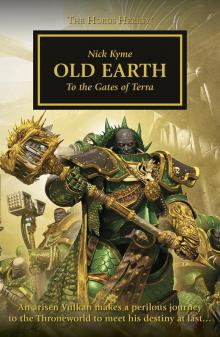 Old Earth
Old Earth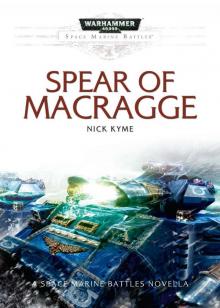 Spear of Macragge
Spear of Macragge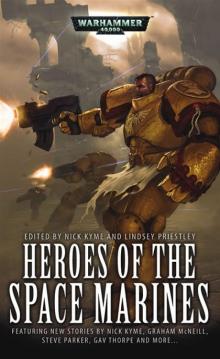 Heroes of the Space Marines
Heroes of the Space Marines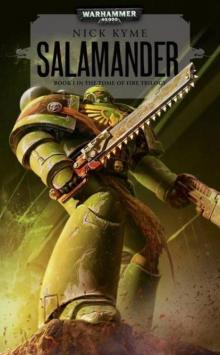 Salamander (warhammer 40000)
Salamander (warhammer 40000)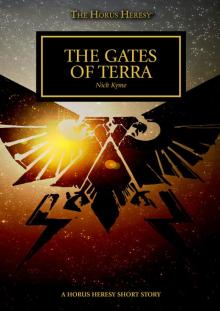 The Gates of Terra
The Gates of Terra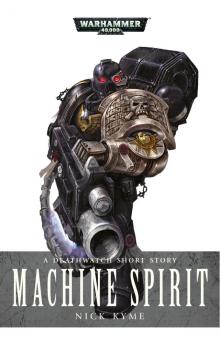 Machine Spirit
Machine Spirit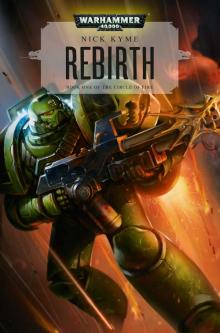 Salamanders: Rebirth
Salamanders: Rebirth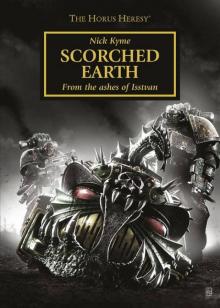 Scorched Earth
Scorched Earth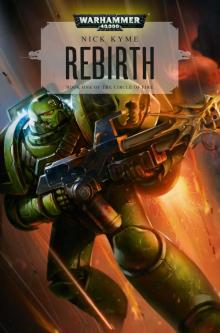 Rebirth
Rebirth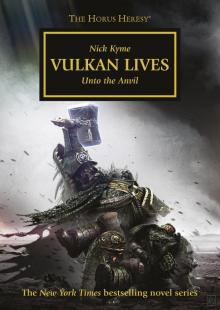 Vulkan Lives
Vulkan Lives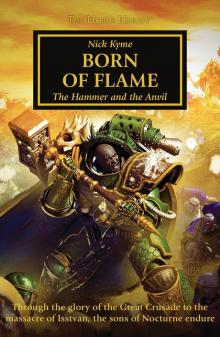 Born of Flame
Born of Flame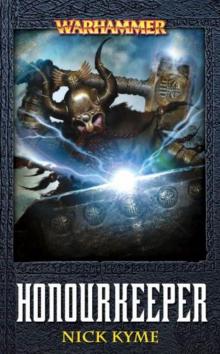 Honourkeeper
Honourkeeper